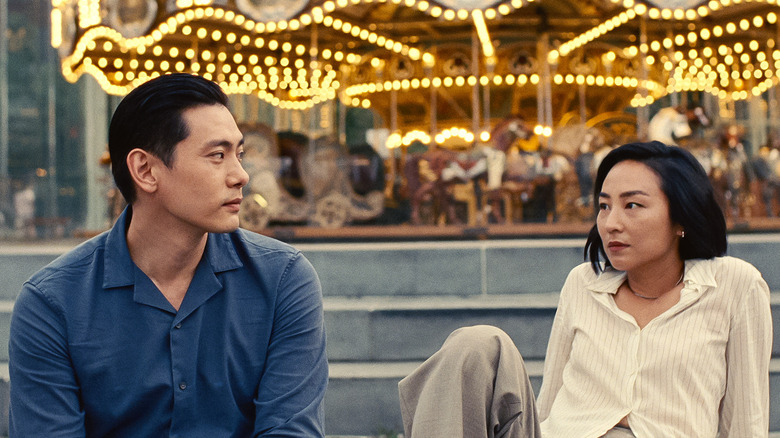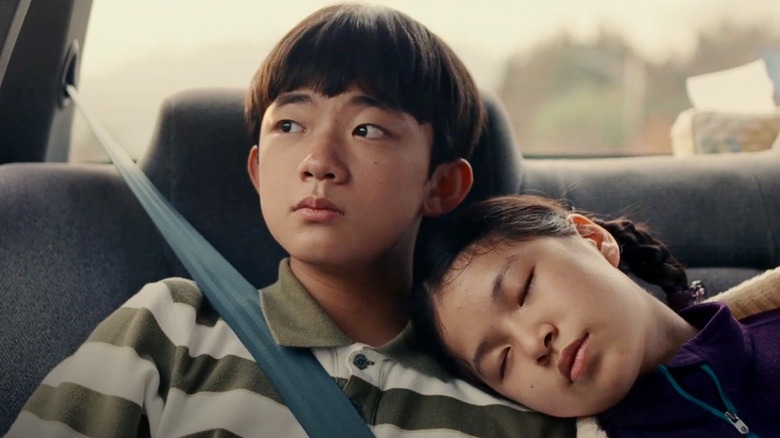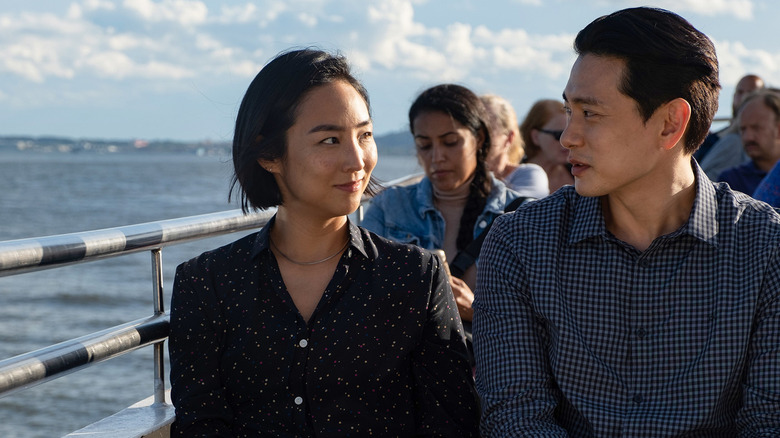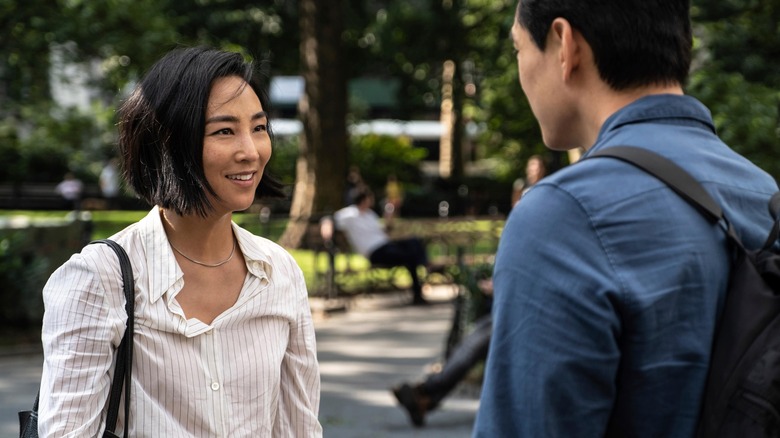Past Lives' Celine Song Talks About Writing And Directing Her Devastating Debut Film [Exclusive Interview]
"Past Lives" is a heartfelt film about two childhood friends, separated by hemispheres at 12 years old, who end up reconnecting over 20 years later. Although there's still clearly something there between Nora (Greta Lee) and Hae Sung (Teo Yoo), adult Nora is now happily married. It's a messy situation, one that director/writer Celine Song handles in a consistently thoughtful, captivating way. (For more about how "Past Lives" is one of the year's best films, you can read /Film's review of it here.)
What makes this movie even more impressive is that it is Celine Song's directorial debut. Although she's written and directed plays and worked as a staff writer on "The Wheel of Time," it's still almost hard to believe, watching "Past Lives," that this was made by a first-time filmmaker. /Film got the chance to talk to Song about the challenges that came with switching over to the medium of film, and some of the creative choices she made in the process.
Note: This interview has been lightly edited for clarity and brevity.
'It actually needed to be told through screen'
As someone who started off in theater, what made you know "Past Lives" had to be a film, not a play?
I think because the fundamental part of the story is happening over decades and spans continents, because of those things, I felt like it actually needed to be told through screen. Because actually, the locations and how different the locations are between Korea and New York, Seoul and New York, that actually is a fundamental part of the storytelling. I thought that it was important to show those places and show how different they are, because that is a part of what keeps Hae Sung and Nora apart, actually.
The other part of it is, it also is a movie about aging. It's a movie that involves a person in many parts of their lives and growing up and growing older. And I think in that, it just always felt like I needed to be able to cast children for the childhood part, for example. It really was about the storytelling. It just made sense, given how important those things are for the movie.
Were there any changes from theater to film that surprised you?
I think what I really love about theater is that it is done live, but there's so much control, because the space in which the show has to happen every night is the same. The set remains the set. And in that way, there's a bit of control of what the environment that the story's going to be told is.
What I was surprised by is how much the weather plays a part, and how much the sun plays a part and where the sun is. Depending on the time of year, the sun sets at 4:00 PM, and we just lose the light. There's just some parts of it where there's so little control in that way when it comes to, especially when you want to do something outdoors, something that's outside of a set. It's like so much of it actually is at the whims of the gods, the weather gods. Sometimes you have 30 minutes to get a scene, and then a fire truck shows up and then parks itself right in front of John Magaro's face. And then now, John Magaro's face is red because of the light from the fire truck. And you're like, "Wow. I really couldn't have planned for that."
I think of the volatility, or the chaos, and as somebody who's a bit of a control freak, as somebody who likes having control, I think letting go of that control was a really big part of the learning process in becoming a filmmaker.
Speaking of the weather, one of the moments that got the biggest laugh from the audience at my screening was when Hae Sung is going to New York for the first time, and his friend says, "You poor bastard. It's going to be raining the whole time." Was any of that because of the weather conditions at the time of filming?
No, I thought it would always be raining there, because I think that it's more like, Hae Sung is deluding himself saying that he's going to New York for vacation. But we all know, the friends know, and eventually Hae Sung will realize, that he's going there to see Nora again. To me, the weather, it's like a fallacy, but it's also, it's like New York saying, "No. You're not. [laughs] No, no, no. You're not coming here to..." It's kind of like New York's response to his attempted self-delusion. That was always in the script. And then, of course, in prepping the movie, I realized how hard it is to get rain, how expensive rain is. It really was. It was scripted first, yeah.
'It's my responsibility that this movie's good'
Before this movie, you also worked on "The Wheel of Time" as a staff writer. Any lessons learned from that project that you took into this one?
Well, I think I learned so much about leadership from Rafe Judkins, who runs the room. He's the showrunner. I think what I learned from him is that leadership is not something where you're nice or good to everyone or something like that, because I think those things are sort of a basic part of any relationship. You should be all of those things. And Rafe is so nice.
But I thought that actually, what makes him an amazing leader is his willingness to take responsibility. And I thought that really took me through so many moments on set where I was like, "No. I actually have to take responsibility for the hundreds of people who are working on this movie and this project." By taking responsibility, I am able to also allow the best work from everybody else.
Because I feel like sometimes you don't want to pitch an idea, you don't want to tell me something that you see or that you think about as my collaborator, because you're worried that you're going to take the blame for it, or you think that maybe if it was wrong, it becomes your fault. Because if there is no one who's saying, "It is my responsibility that this movie is great," I think sometimes it's a little bit hard to take risks in that way.
I think I learned from Rafe that before anything else, the first thing is, I have to say, "Hey, I really — I just need you to know that it's my responsibility that this movie's good, so don't worry about it. You don't have to take responsibility for that. Just tell me. Just tell me what you think. Tell me what you think might be helpful."
I think that kind of amazing attitude, like an openness, like a leadership, I think I learned from Rafe, who is just an amazing human being.
Were there any scenes or subplots that you wanted to include in the film but you had to cut for any reason?
Let me think. Not really. I had a little bit more in Nora's grad school section where I felt like there were some moments in there that I thought Nora's friends and Nora were living their New York writer life. And I had a little bit more in there, but then I realized, no, actually, the movie is just about the three of them [Nora, Hae Sung and Arthur], and I should really streamline.
Yeah, I like how so much time goes by, and you just let the viewer kind of imagine what that time was like.
Yes, of course. Just a few images to convey the whole thing.
Were there any other movies you took inspiration from while making this?
I feel like I was thinking a lot about, I wanted the language of the movie to be its own thing. I wasn't really thinking about a whole movie that the movie wanted to homage or something like that. It was so much more about, "Okay, well, how can I tell this story in a way that is only unique to the movie itself, that this movie's just going to exist as its own thing?"
As a first-time filmmaker, I especially felt like I needed to do that, because I wanted to find my voice in it, too, in the storytelling. I wanted to find my voice. But I think there were things that I took from, that I looked to, to help me solve some filmmaking problems.
For example, I feel like "My Dinner with Andre," I made everybody watch and I talked about a lot when it came to shooting the scene in the bar at the end. Because the way that conversation has to go is sort of similar to the way that the conversation goes in "My Dinner with Andre" and the way that's made, because it is sort of like — it's just like an angle on the actor's faces. And within that, in the performance, they're able to have a really deep conversation and you don't realize how much time has passed. You don't realize where we're going in the conversation, but the kind of amazing edge-of-your-seat feeling, even though it's just the one conversation, I really was thinking of that movie a lot when I was making this movie.
Yeah, I've got to watch that movie. I've seen it referenced in a "Community" and other shows a bunch of times. It sounds really good.
Yeah, it's kind of a funny thing, because it literally is just, "My Dinner with Andre," it is one conversation, the whole thing.
'Maybe there's something interesting about an older Nora'
You mentioned in a Deadline interview that there were some challenges or differences when it came to filming the scenes in Korea versus in New York City. Can you tell us a little more about the change in approach that came with the different locations?
Just the basic fundamental blocks of the filmmaking culture is different. For example, the way that being a leader works is very different. There's no real role that is the production designer — not always, not really, in Korea. And so for example, that role was something that my production designer that I brought from New York worked through to really be able to do, because just the making of the movie is different.
Departments are different. I think my DP [Director of Photography], Shabier Kirchner, he was saying that it's actually closer to the UK system, but it is also mixed in with other kinds of filmmaking culture. I think that in translating that, I think it really had to let us stay really nimble. For example, when we were shooting on location in New York, we were getting permits. And in Korea, you don't really get permits to shoot on location. Some places you do, but not always.
Sometimes, you're just showing up to the place with a full film crew and just start rolling, which I thought was so wild, because in New York, you can't move a piece of rock without telling the city about it. [laughs] It's just a completely different approach to even being able to get into a location.
In previous group interview, Greta Lee talked about how she was originally turned down for the main role of Nora. Then a year later, you had a really long phone conversation with her that led to her being cast. Can you talk a little about what changed within that year? What led to her getting the part?
It really had to do with my own aging, because basically, when that event that was in between my childhood sweetheart and my husband happened, that really sparked the beginning of this movie, I was 29. I thought being 29 was really important, because when you're 29, you think ... I don't know. How old are you?
25.
Okay. Okay. Maybe you don't know, but you think that being 29, you're almost 30. You're not 30 yet, so you think that it's important. You're like, "Wow. I'm 29. I'm at the end of 20s. I'm basically going to be old tomorrow." There's kind of a sense of it where you think that 29 is a significant age. But then, you turn 30 and 31, and then you're like, "It doesn't matter." You're just like, "That's not that significant."
And actually, maybe there's something interesting about an older Nora, a Nora who is deep in her 30s. It really was that. Initially, I thought that Greta was not the right age for it. Then, I eventually changed my mind on that, because I personally got older, and I was like, "Oh, actually, that is really interesting, maybe, and maybe I do want to depict somebody who is in their 30s instead of somebody who is in their 20s." That's why it made me go, "Yeah." And Greta's such a great actress, so I thought maybe she would be the perfect person for it.
That makes sense. So we've got time for one more question. This is a film that really takes advantage of quiet stretches where no one says anything, which I really liked. But can you talk a little bit about how much of those pauses were part of the script from the beginning, and how much came about organically through filming or the acting?
I write in all my pauses and all my silences, and pauses and silences are different. Silences are long and prolonged, and pauses are just time that it takes for a character to think before they come up with a response.
I write all of them, but of course, I think the length of the silences, that's a musical thing. It's like music. It's something that either I'm choreographing or the actors are doing. Then of course, if I feel like it's too long or too short, I think that I would go and I would calibrate like, "I think, yes, take an extra beat there before we continue."
Yeah, that's got to be an interesting balance to try to find.
Of course. And it's subjective. It's not something that you can time. You have to feel it. It's a feeling thing.
"Past Lives" is now available in select theaters.



